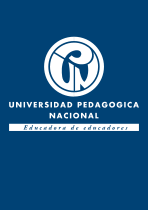Experiencia y problemas. Educación ciudadana y enseñanza de la filosofía.

Citación
Fecha
2017-07-14Autor
Vargas Guillén, Germán
Meléndez Acuña, Raúl Ernesto
Herrera Romero, Wilson Ricardo
Enlace al recurso
https://revistas.pedagogica.edu.co/index.php/PYS/article/view/6462Palabras claves
Formación
Democracia
Fines de la educación
Pensamiento crítico
Ambientes de aprendizaje
Keyword
TrainingDemocracy
Purposes of education
Critical thinking
Learning environments
Formação
Democracia
Fins da educação
Pensamento crítico
Ambientes de aprendizagem
Metadatos
Mostrar el registro completo del ítemResumen
Este artículo de reflexión parte de las preguntas cómo enseñar filosofía y para qué enseñar filosofía. En él se problematizan los alcances de la enseñanza de la filosofía en torno a los fines de la educación, específicamente, al de la democracia. Se sostiene la tesis de que una educación filosófica es base de la educación ciudadana toda vez que pone a los sujetos, a través de su formación, en condiciones de reflexionar sobre sí mismos, sobre su entorno, y sobre su relación con los otros. El artículo se organiza en tres partes: la primera presenta los fines de la educación como fuente de sentido de la enseñanza de la filosofía en función de una educación filosófica; la segunda, analiza el alcance del concepto de experiencia como eje articulador de los polos (problemas y pensamiento crítico) que tensan la educación filosófica y, la tercera que presenta las conclusiones, señala cómo esta tensión (problemas y pensamiento crítico) puede ser operada en el aula de educación básica.
Abstract
This reflection article starts from the questions on how and why philosophy should be taught. It problematizes the scopes of teaching philosophy with regards to the scopes of education and, specifically, of democracy. The thesis is that a philosophical education is the foundation of a civic education, insofar as it puts the subjects in a position to reflect about themselves, their environment, and their relationship with others. The paper is divided in three parts: the first one presents the goals of education as a source of meaning in the teaching of philosophy in terms of a philosophical education; the second part analyzes the scope of the concept of experience as the articulating axis of the two poles (problems and critical thinking) that strain philosophical education; and the third part shows, as a conclusion, how this tension (problems and critical thinking) can be implemented inside the classroom in the process of basic education.
Editorial
Editorial Universidad Pedagógica Nacional
Fuente
Colecciones
- Pedagogía y Saberes [660]
